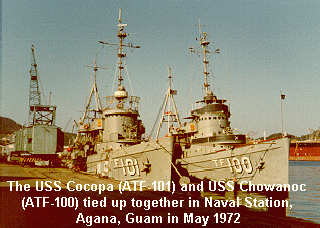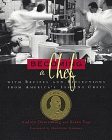
My Journey To Vietnam
By Steve Karoly
 From
May to December, 1972 as a 19 year-old sailor, I made my
first Western Pacific, or WestPac, cruise on the U. S.
S. Cocopa (ATF-101). For the first two months of the
deployment, she cruised between Asian ports, towing ships
and target sleds, visiting Pearl Harbor, Guam, Subic Bay
and Koashung.
From
May to December, 1972 as a 19 year-old sailor, I made my
first Western Pacific, or WestPac, cruise on the U. S.
S. Cocopa (ATF-101). For the first two months of the
deployment, she cruised between Asian ports, towing ships
and target sleds, visiting Pearl Harbor, Guam, Subic Bay
and Koashung.
Then in mid-June, the Cocopa called on the Subic Bay Naval Station for routine maintenance upkeep. We prepared for her first visit to Vietnam since 1969. After towing target sleds July 2-5 along the northern Luzon coast, we returned to port for four days.
Our journey to Vietnam began on July 9, 1972.
Many in ship's company had never been to Vietnam. As the ship labored between ports, we wondered when the Cocopa would go. Being young and anxious, we were ready to go as much out of curiosity as for any other reason. We had not experienced war, nor were we prepared to accept its consequences. (Bruce Williams of radio's Talk Net often tells his young callers being young is a sin; it's just not mortal.) As circumstances would have it, the Cocopa's last tour in Vietnam turned into a milk run.
Nineteen years later, in January, 1991, the Navy called me to another war, Operation Desert Storm. As my Naval Reserve unit prepared to ship out, I believe my sense of duty was much stronger. Yet, I had a heightened sense of the consequences of war and the cost to my family. Many in my unit, the 17th Seabees, were older Vietnam Vets who had a keen awareness of chemical warfare and its effect on the human body. Yet, we were prepared to make sacrifices.
During our second week in Subic, the Captain told the crew we were going to Vietnam, stating we would take several large crates to Da Nang. Scuttlebutt said the skipper pulled strings to get the Cocopa to Da Nang. In 1972, fleet tugs were needed in Hong Kong, Koashung and Sasabo, not Vietnam. After Vietnam, the Cocopa was scheduled to visit Bangkok, Thailand.
Typhoon Olga greets the Cocopa
The Cocopa slipped into Subic Bay on a stormy Saturday morning. No farewell was offered, nor did we look for any. Our departure seemed routine. We were going to sea to do the work fleet tug sailors do best: towing and transporting large crates to Vietnam.
All of our visits to Vietnam that summer were routine. The Cocopa, as a working ship, went to war to work, not to fight. She never fired a shot in anger during any of her tours in Vietnam in 1972. (Incidentally, her main battery, mount 31, lay on the deck, disassembled for repairs, as we pulled into Da Nang three days later.)
Alava Wharf, home for several days, grew smaller as she slipped into the bay. Grande Island and the entrance to the South China Sea lay dead ahead.
I was to busy to watch our departure. As galley cook that morning, I cooked hamburgers, French fries and beans. I busily served crewmen who staggered through the chow line as they were released from sea and anchor detail. My work kept me from noticing the obvious: a typhoon would soon greet the Cocopa as she entered the South China Sea.
While still in the harbor, I ate two hamburgers, each smothered with my favorite condiments: catsup, mustard and pickles. My French fries were hot and greasy, golden brown and covered with catsup. A bowl of baked Navy beans, flavored with the right amount of molasses, bacon and tomato sauce, finished my lunch. True to my boot camp training, I devoured it all within minutes. Soon, I paid the price for my gluttonous ways.
Even in the harbor I could see white caps. Overcast and raining, the Cocopa's glide quickly turned into the familiar pitch and roll as she approached Grande Island. The rhythmic motion sailors enjoy quickly changed. With each pitch and roll, the Cocopa's response to the waves became chaotic and disorganized. Each swell greeted the bow in anger. Tons of water drenched the anchor detail on the forecastle. After each roll to starboard, the seas quickly jerked the Cocopa back to port as the bow slammed into the next wave.
I could see I was in for a long voyage to Vietnam.
The South China Sea lays dead ahead
Through the fog and rain, Grande Island appeared off the port beam. Waves crashed against the hull. The Cocopa slammed into the next breaker. Upon entering the open sea, this tired, old tug sounded as if she would break up at any time.
What away to go to war, I thought. This was not going to be a good week. I had to endure a storm so damaging, a storm that had the power to defeat Admiral Halsey in '44. But the Cocopa held together and kept sailing to the west, towards Vietnam.
Hamburgers and beans, like lethal projectiles, shot across the galley. My hands reached for something to hold on to. I had a split second discussion to make: grab the copper full of boiling water or the hot oven door. Instead, I ducked for safety. It appeared as if someone was using me for target practice.
The Cocopa slammed into the next wave. Shelves expelled their contents. Pots and pans danced about the deck. Spice cans dropped like grenades. My French knife, laying on the cutting board, hurdled towards me as if it were under its own power. The galley was not prepared for a typhoon.
A rescue boat slamming into breakers has more grace. The decks of the Cocopa danced about like an excited chimp warning others approaching danger. Endless motion seemed eternal. We couldn't escape the twisting and turning of the ship. Tons of water washed decks.
My thoughts went wild: what if the lifeboats washed away? What if the ship broke in two? How can I escape this eternal hell on water?
Abruptly, an announcement from the bridge interrupted my thoughts: "The weather decks are secured until further notice."
"Only necessary personnel are authorized topside," continued the announcement. "All personnel going topside will wear life jackets and be secured to a life-line by orders of the Captain."
Watching the enraged seas through the porthole made me sick. I ran aft to the crew's head. My head pounded. My stomach wrenched in pain. Vomit gagged me. Turning into the second shower stall, I lost my lunch: two burgers and a pound of fries and catsup. Wiping my mouth, I slung the shower curtain closed, washed my face and hands and ran to the galley. (The First Division head cleaners never found me. Much later, I over heard their unkind comments.) For a fleeting second, I felt better. The endless motion and my sour mouth reminded me that the typhoon didn't retreat.
Again, my mind raced in thought: would this be my last moment of life here on earth? After rolling fifty degrees to starboard, the quartermaster kindly informed the crew if she rolled two more degrees, we would sink. Would the Cocopa withstand the stress? Could my body endure any more of this incessant strain?
In an hour I had gone from a gung-ho, energetic cook to a broken mass of flesh. I searched my mind for every conceivable method to escape reality. I found none. Death appeared near. Think of that, I was dying a slow death at the hands of King Neptune. All I wanted to do was curl up in a ball and sleep away my troubles.
But the crew had to eat.
| Bulletin Board | Keyword Search |
| Bookstore | Links |
| About Us | Recent Additions |

